Dick’s MPAA Flap
Kirby Dick is complaining that the MPAA illegally copied, apparently for internal purposes, a “digital version” of his new film This Film Is Not Yet Rated, which a several journos saw at a press screening yesterday morning and which screens at 9:30 pm tonight at the Sundance Film Festival.
More to the point, Dick got L.A. Times reporter John Horn to do the squawking for him in a piece that ran Wednesday (1.25) called “Avast, Ye Pirates!” It struck me as a thin beef, but it made for good press.
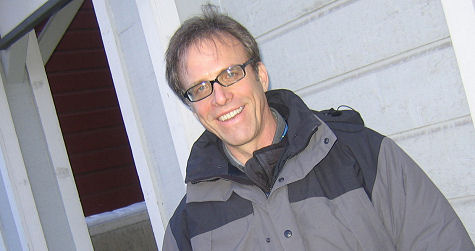
This Film Is Not Yet Rated director Kirby Dick on Park City’s Main Street — Tuesday, 1.24, 4:20 pm.
The dust-up was partly about an issue of secrecy, but what it really boiled down to was one of anger and frustration on the part of Dick and many, many film directors who have long despised what they see as an unfair and highly arbitrary ratings system.
And so Dick has struck back at the MPAA in a nyah-nyah way that he knows will hurt and enrage the ratings and appeals board members — he’s “outed” them.
< ?php include ('/home/hollyw9/public_html/wired'); ?>
The MPAA has a policy of keeping the identities of the its Ratings and Classification Board secret. Dick’s position is that filmmakers have the right to know the names of those people on the MPAA ratings board who occasionally slap their films with absurd and restrictive ratings that end up hurting the economic prospects of their films.
Therefore, This Film Is Not Yet Rated is partly about Dick hiring a lesbian private investigator to unmask the identities of the MPAA’s ratings board members, as well the big wheels on the appeals board.
The film tracks the progess of Dick and his investigator (along with the woman’s junior assistant) as they park outside MPAA headquarters in the L.A. suburb of Woodland Hills, write down their license plate numbers, follow them on their way to restaurants and on errands, and in one case sifting through garbage.
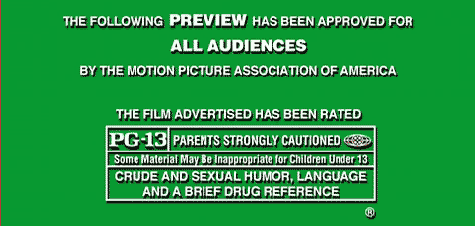
By the end of the film the raters are pretty much totally exposed — names, backgrounds, in some cases photos, the ages of their children, and in some instances the kind of cars they drive.
Horn’s story says that Michael Donaldson, a lawyer representing Dick, has written the MPAA and demanded that it “immediately return all copies” of the film in its possession and explain who approved the making of the copy and who within the MPAA has looked at the reproduction.”
Dick recently discovered during a recent conversation with an MPAA lawyer that the MPAA had copied the film from a digital version he submitted on 11.29 for a rating. The MPAA’s copy of Dick’s film was viewed by Dan Glickman, the MPAA’s new president, the MPAA said.
“Dick said that when he asked MPAA lawyer Greg Goeckner what right his organization had to make the copy, Goeckner told him that Dick and his crew had potentially invaded the privacy of the MPAA’s movie raters< ' Horn's story says.
"We made a copy of Kirby's movie because it had implications for our employees," said Kori Bernards, the MPAA's corporate communications vp. She told Horn that Dick's spying on the MPAA raters led the organization to feel "concerned about the raters and their families," Bernards said.
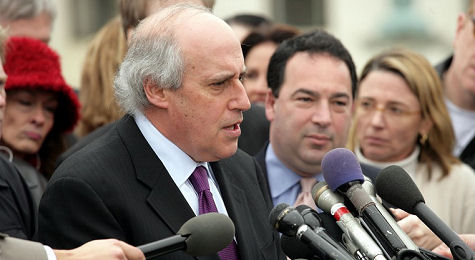
MPAA chief Dan Glickman
She said the MPAA’s copy of This Film Is Not Yet Rated is “locked away” and is not being copied or distributed.” She added that the organization was operating lawfully when it copied Dick’s movie, saygin that “the courts recognize that parties are entitled to make a copy of a work for use as evidence in possible future proceedings.”
MPAA chief Dan Glickman told AP reporter Dave Germain that normally he doesn’t watch films submitted for ratings but that he viewed most of This Film Is Not Yet Rated — the MPAA’s copied version, apparently — because he “heard they used unusual surveillance techniques to follow our raters around.”
“I decided the privacy of our employees was in jeopardy. I didn’t know if there was some violation of law, maybe, but I thought that was going way too far,” Glickman said.
Dick’s film is a hugely entertaining, sharp-tongued trashing of the MPAA’s absurd and politically lopsided rating calls.
These include the board’s well-known tendency to attach R and NC-17 ratings to films showing scenes of sexual pleasure but allow scenes showing horrific and/or grotesque violence to prretty much skate. The ratrings board is also known for being harder on depictions of gay over hetero sex, and for giving indies a harder time than the majors.
The sage and sometimes very funny talking heads include directors John Waters, Kevin Smith, Todd Solondz, Wayne Kramer, and indie distributors Mark Urman and Bingham Ray.

Grabs
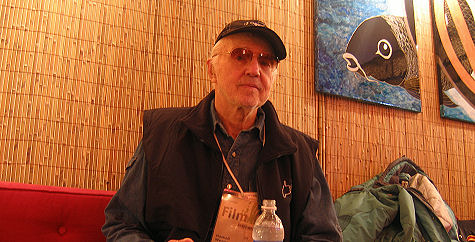
Haskell Wexler, director of Who Needs Sleep?, at the VW Lounge on upper Main Street — Tuesday, 1.24, 3:45 pm.
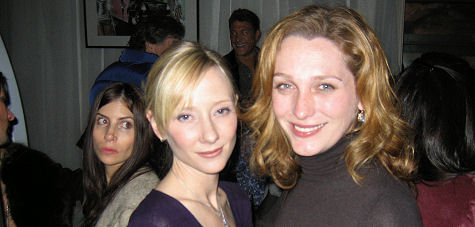
Anne Heche and a friend/colleague at the after-party for Wim Wenders’ Don’t Come Knocking — Tuesday, 1.14, 11:50 pm. I searched through Heche’s IMDB profile and don’t see a Sundance ’06 film among her credits, so I guess…well, it was nice to say hello.
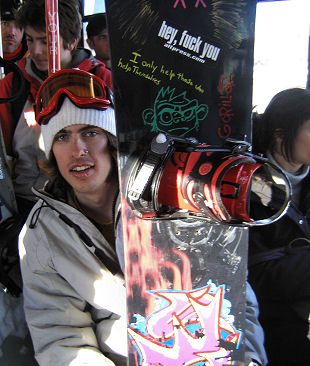
Non-celebrity on bus heading into town from Kimball Junction
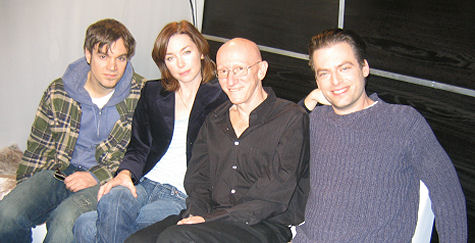
Flannel Pajamas costars Jamie Harrold (I think) and Julianne Nicholson, the film’s director-screenwriter Jeff Lipsky, and costar Justin Kirk — Tuesday, 1.24, 2:19 pm. Roger Ebert has praised this unusual romantic drama, and a woman I spoke to an hour ago has said, ‘Naaah…not for me.” That makes it an absolute must-see.
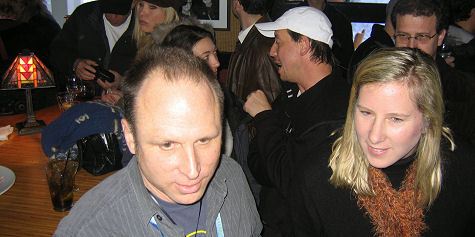
Picturehouse chief Bob Berney (lower left) during latter stages of party thrown by his company at Zoom on lower Main Street — Tuesday, 1.24, 5:15 pm .
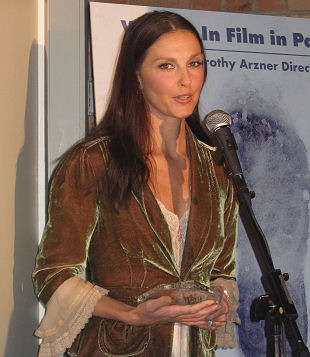
Ashley Judd, star of Joey Lauren Adams’ Come Early Morning, presenting a Women in Film award to Adams — Monday, 1.24, 8:10 pm.
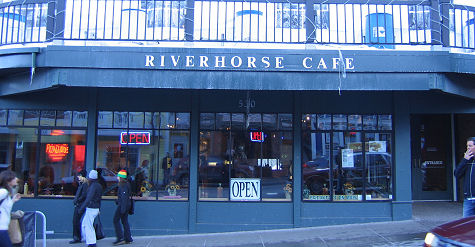
Exterior of Riverhorse Cafe — Tuesday, 1.24, 4:10 pm.
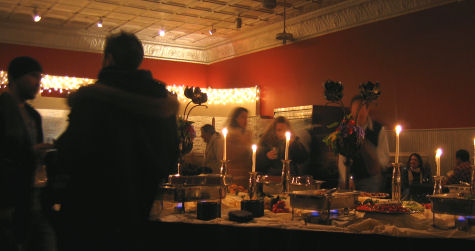
Dining room of Park City’s Riverhorse Cafe during Women in Film party — Monday, 1.23, 7:25 pm.
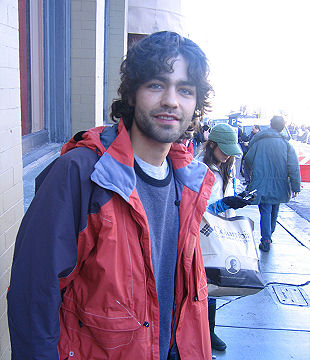
Documentarian and Entourage costar Adrian Grenier on Main Street outside VW lounge — Tuesday, 1.24, 3:55 pm.
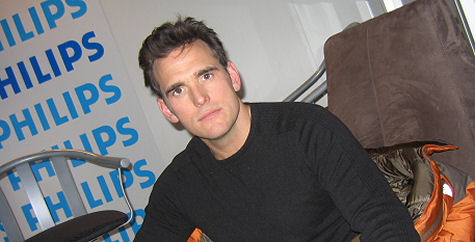
Matt Dillon during our interview about Brent Hamer’s Factotum, the latest and finest Charles Buklowski-inspired film ever made. Dillon’s performance as Bukowski’s alter-ego Henry Chinaski isn’t just more nuanced and naturalistic than Mickey Rourke’s riff on the boozy writer-poet in Barfly and Ben Gazarra’s in Tales of Ordinary Madness — it also exudes an exceptional dignity.
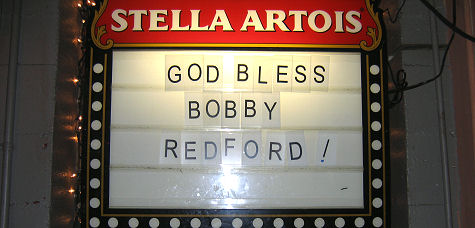
Hanging in one of Park City’s two townie bars.
Lonely Deliverance
The hype was reliable, the accomplishment is major and it seriously touches the soul. And thus it seems, now, that Christopher Quinn’s God Grew Tired of Us is the reigning “heart” movie of the Sundance Film Festival.
It’s a lusciously photographed, exquisitely edited piece about John, Daniel, and Panther — three young Sudanese men, all refugees from their country’s ongoing, utterly devastating civil war — who escape to America to start new lives only to encounter profound longings for home and family, and no small measure of guilt.
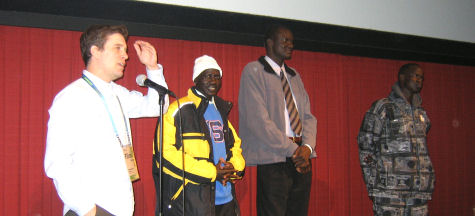
(. to r.) God Grew Tired of Us director Chistopher Quinn and the film’s three hero-stars — Panther, John Bul Do and Daniel Abul Pach — during post-screening q & a.
I don’t care if this sounds intemperate, but feelings of humanitarian compassion and admiration for these three Sudanese men…indeed, for the indominability of the human spirit…flooded the Holiday Cinemas theatre where God played late yesterday afternoon.
There’s no distributor on board yet, but it can be safely assumed if and when it opens later this year that God Grew Tired of Us will nab a Best Feature Docu- mentary nomination.
You could feel the moist emotion in the room after Monday’s 5:30 pm screening came to an end. The packed house gave a standing ovation to the film’s three “stars” — John Bul Dou, Daniel Abul Pach and Panther (whose full formal name isn’t clear to me as I write this) — as they stood in front of the screen alongside Quinn.
Another measure of the riveting emotionalism of God Grew Tired of Us is that a middle-aged woman from Texas came up to Duo right after the q & a and, knowing of his ongoing effort to raise funds to pay for a medical clinic in Duk county in South Sudan, wrote his organization (called the American Care for Sudan Foun- dation) a check for $25,000.
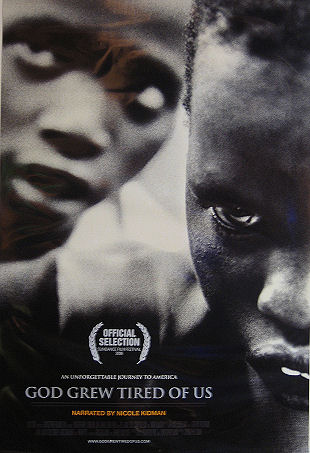
To escape the ravages of the Sudanese civil war (northern Muslims vs. southern Christians) in the late ’80s, roughly 27,000 Sudanese “lost boys” braved the danger and starvation of a months-long trek across desert terrain into Kenya. The U.S. government eventually invited some of the boys to settle in this country, and the tightly woven God (it runs only about 86 minutes) is the step-by-step saga of three.
God is thus a fresh look at American culture through immigrant eyes, and yet it finds us wanting in several respects.
At first it’s fascinating to watch these guys learn the ins and outs of American materialism, technological abundancy and creature comforts. Then the film turns melancholy when it gauges the downside — the feelings of isolation and loneliness common to immigrant life, and the lack of family support that nourished the trio in Africa.
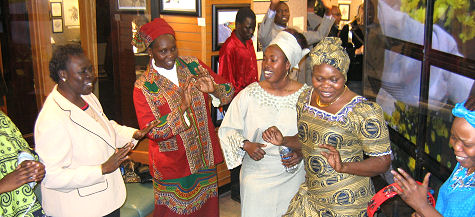
Sudanese women performing at last night’s God Grew Tired of Us party — Monday, 1.23, 8:10 pm.
And yet John, Daniel, and Panther somehow plod through and make the best of it and then some. It’s clear from the get-go they are men of serious character and personal honor, and it’s very gratifying to see them overcome obstacles and not let the coldness of American life get them down.
There was a party after last night’s screening at an art gallery in downtown Park City. Spicy Sudanese food was served and several Sudanese women (there’s a community of some 800 Sudanese living in Salt Lake City) sang and danced.
Brad Pitt and Dermot Mulroney invested in the film and are listed as producers (i.e., executive and associate). The closing credits show that a lot of other Hollywood types were persuaded to pitch in with this and that form of assistance.
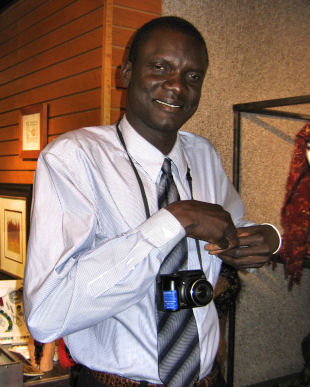
John Bul Dou, one of the three subjects of God Grew Tired of Us and head of the American Care for Sudan Foundation, at last night’s after-party — 1.23, 8:15 pm.
The basic elements of God Grew Tired Of Us have, of course, already been seen in a 2004 doc called Lost Boys of Sudan, directed by Megan Mylan and John Shenk. Their film followed seven Sudanese teenagers who went through the same immigrant experience as John, Daniel and Panther…with variations.
I didn’t see Lost Boys so I’m obviously lacking perspective, but I know an emotional grabber when I experience one, and there’s no question that God Grew Tired of Us does the trick.
One thing that sets it apart from its predecessor, I’m told, is that God has been exceptionally well filmed and cut — i.e., a cut or two above Lost Boys. Content aside, it’s simply a pleasure to watch for its pictorial beauty and expert composition.
Docs Own It
So far the most affecting highs of Sundance 2006 are not coming from the features but the documentaries. No narrative except Little Miss Sunshine has generated any kind of noticable wattage, but everywhere you turn people are talking up the docs.
Yesterday afternoon I saw Freida Mock’s conventional but nonetheless moving and impassioned Wrestling with Angels, a study of the great playwright Tony Kushner. Here, at last, was a film of serious substance and palpable emotion…something that woke me up…a movie about caring and striving and laying it on the line.

An acquisitions guy who’s been vigorously making the rounds told me last night that Christopher Quinn’s God Grew Tired of Us, a study of young Sudanese refugees, is an Oscar-level achievement. (I’ll be seeing it this morning, and — not that this matters — there’s a reception for Quinn from 8 to 10 pm tonight.)
I detected heartfelt enthusiasm last night in response to yesterday’s 3 pm Eccles screening of Stewart Copeland’s Everyone Stares, which is said to provide epic coverage of the career of the Police in the late ’70s and ’80s. I won’t see it until 11:30 pm tonight at Prospector Square but I’m sensing the alignment of coming pleasure.
Ditto Jonathan Demme’s Neil Young: Heart of Gold, which screens tonight at the Eccles at 9:30 and tomorrow (Tuesday) at the Library. How can this not be a fine deep-drill meditation about an indusputably great songwriter and performer, no matter how Demme decides to play it? The elements seems unquenchable.
Haskell Wexler’s Who Needs Sleep, which is showing right now at the Holiday Cinemas (and which I’m obviously not seeing because I’m writing this) did well at the Library on Saturday evening. Okay, I didn’t poll the audience but I’ve spoken to two journos who saw it, and they were well satisfied.
Thin, Lauren Greenfield’s doc about eating disorders, is reputedly exceptional… although I still have yet to see it.
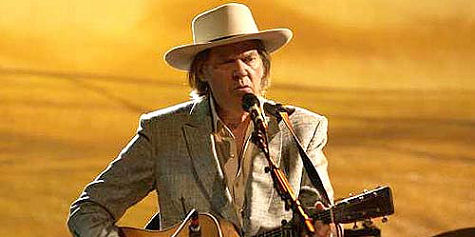
Neil Young
There was ample respect and satisfaction shown for Lian Lunson’s Leonard Cohen I’m Your Man when it played the Toronto Film Festival last September, and the response has been the same in Park City. (And there’s no colon after “Cohen”… this is how the title reads.) The IMDB says Lionsgate will be releasing it in May.
The selling point of Nathaniel Hornblower’s Awesome: I Fuckin’ Shot That!, which ThinkFilm will release in late March, is in the concept. It’s a Beastie Boys concert doc shot by 50 fans who were handed video cameras and urged to shoot away. The word on it has been strong since before the festival began.
Not to mention Patricia Foulkrod’s Ground Truth: After the Killing Ends, Steve Bognar and Julia Reichert’s A Lion in the House, Malcolm Ingram’s Small-Town Gay Bar…obviously I’m just laundry listing and you can call it hot air, but docs are where the current is.
To Live By
I can’t provide a clip from Freida Lee Mock’s Tony Kushner doc, Wrestling with Angels, but I’ve found a sampling of the exceptional joie de vivre that this gifted writer seems to exude every time he steps in front of a mike.
It’s a portion of a Class Day address that Kushner delivered a delivered to grad- uating Columbia University students in June 2004. Read it, or watch the video.
Think not of the content as words meant to inspire students, but all of us. Each morning of each day begins the remainder of our lives.
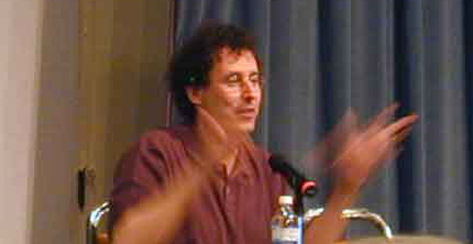
Tony Kushner
“This is the Columbia dialectic, the New York City dialectic, all this spectacular symmetry, all this Euclidean geometry…all this rational griddage is a lattice entwined with floribund, uncontrolled and uncontrollable vines, shoots, roots, fruits, leaves, bees, busily cross-pollinating.
“This box, this machine, this is a crystal incubatory whence comes the fluid, the protean, the revolutionary, the non-mechanical, the non-commodified, the non-fetishized, the human. The air this morning is electric. You have fed, you have sated, you’re ready…and every step you take from this point on counts.
“This is your Code Orange: Life and its terrors, terrible and splendid, awaits. I know I speak for Jon, Warren and Justice Ruth — seek the truth; when you find it, speak the truth; interrogate mercilessly the truth you’ve found; and act, act, act.
“The world is hungry for you, the world has waited for you, the world has a place for you. Take it. Mazel tov. Change the world.”
Holding Pattern
Saturday’s snowfalls (there were at least two) in Park City seemed far more nour- ishing and stimulating than any of the four films I saw: Laurie Collyer’s Sherrybaby, Julian Goldberger’s The Hawk is Dying, Patrick Stettner’s The Night Listener and Mia Goldman’s Open Window.
If there’s a general impression so far, it’s that festivalgoers are underwhelmed so far (apart from Little Miss Sunshine). It’s fun going from screening to screening and trucking around and running into friends, but none of the films have struck anyone as genuinely powerful or heavy-duty.
Apart from the four I sat through, nothing happened yesterday except for people talking about the $10 million Fox Searchlight purchase of Little Miss Sunshine, a couple of pleasant-vibe parties, a lot of time spent in impossibly congested traffic jams, especially on the main road in downtown Park City, which is a ridiculous alcoholic zoo.
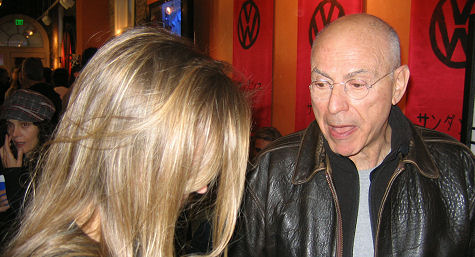
Little Miss Sunshine costar Alan Arkin grilled by a blonde at party thrown for Sunshine and Sherrybaby by Big Beach at VW Lounge — Saturday, 4:45 pm
I’ve heard good things about Lauren Greenfield’s Thin, which shows tonight (1.22) at the Holiday Village cinemas. (My only concern is an enthusiastic review that David Poland wrote about this film last night. Beware: underneath every Poland rave is a potential for another Devil and Daniel Johnston meltdown.)
I’ve also heard stuff about the Tony Kushner doc Wrestling with Angels, which I’m going to try to see today at 5:30 pm.
As I was leaving the Eccles just after Saturday’s 6 pm Night Listener screening I mentioned to a journo pal that watching it felt like being in a kind of prison…a windowless isolation cell in Iraq during the Hussein regime. It’s a movie for dead people — the whole thing is entombed. Almost every shot is enveloped in shadows and blackness, and your kindly torturer is a bearded and extremely old and withered-looking Robin Williams.
Written by Amistead Maupin, Terry Anderson and Stettner, The Night Listener is based on a mostly true story (or so I heard). It’s about a radio talk-show host who becomes intrigued by a young sickly kid (Rory Culkin) he’s spoken to on the phone but has never seen, and about his search for the boy and some very curious encounters with a blind woman who seems to be his mom (Tonni Collette).
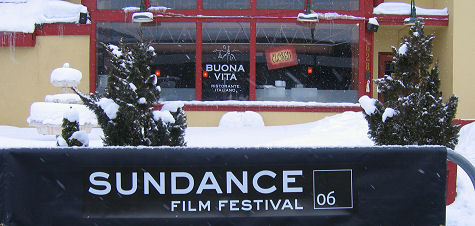
During yesterday afternoon’s snowfall — Saturday, 3:15 pm
What happens is so dreary and stifling I don’t want to recount it, but this is one of those films that makes you repeat that Victoria Wisdom line about “Sundance spelled backwards spells depression.”
It’s startling to consider that the producers of this film thought that filmgoers might actually be persuaded to pay money to see this thing. You program Sundance for “diversity,” and you get stuff like this. This is a real John Cooper film.
Sherrybaby — a melancholy, downward-spiral drama about an ex-drug addict (Mag- gie Gyllenhaal) just out of prison who’s too weak, selfish and lacking in resolve to make any serious changes in her life — felt like the most straightforward and heartfelt of the four.
But as pics about suburban mothers with drug problems go, Down to the Bone (which I wrote about two weeks ago) isn’t as much of a downer because its main character, played by Vera Farmiga, is smarter and more self-aware than Gyllen- haal’s, and she seems more guilty and self-critical about her problem so you’re able to half-root for her recovery.
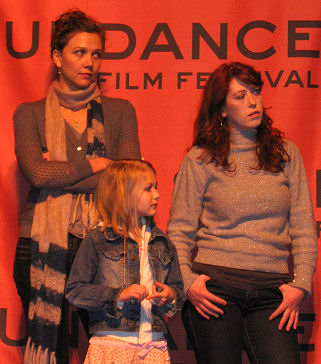
During q & a following yesterday morning’s screening of Sherrybaby at Racquet Club, costars Maggie Gyllenhaal, 8 year-old Ryan Simpkins, Bridget Barkan
Gyllenhaal’s Sherry, based upon a troubled woman from Collyer’s past, is some- what sympathetic. She has a good heart and loves her toddler daughter (who’s been raised by her brother and his wife when she went into prison for theft) and has been deeply hurt by sexual abuse she suffered at the hands of her father (Sam Bottoms). But some people are just born to screw up and fall down, and Sherry is one of these sad sacks and that’s that.
Recovering addicts need discipline, maturity and hard introspection to stay out of trouble, and a lot of them just don’t have the stuff to pull through, and so they wind up wasting their lives and subjecting their friends and families to all their crap for decades. Thank fortune some of them break out of the cycle and climb out of the pit, but most of them don’t.
That said, Gyllenhaal is quite invested and believable (her not being very likable is a choice that Collyer made), and the young girl who plays her daughter — 8 year- old Ryan Simpkins — is flat-out superb.
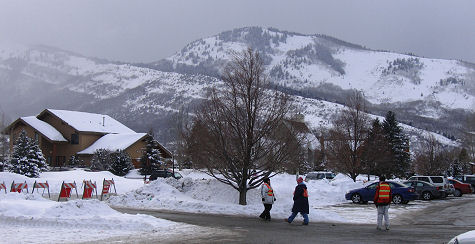
Snapped on the way to screening of The Night Listener — Saturday, 1.21, 5:25 pm.
I haven’t seen his mermaid-in-the-swimming-pool movie, but The Hawk is Dying won’t hurt Paul Giamatti’s career. We all have to work and pay the bills, and some- times we work with friends for the wrong reasons, and moviegoers understand this, I think.
I started thinking about catching a snooze very soon after this film began. I’ve become disciplined enough at sleeping during films that I can make myself wake up every ten minutes just to keep up with the plot. So I can honestly saw that I saw maybe half of it, and that the portions I saw left me totally cold.
Set in the south, The Hawk is Dying is about an owner of an auto upholstery shop named George who lives with his grotesquely fat sister and her mentaly challenged son Fred (Michael Pitt). George is into training falcons, and the footage of him capturing and training a red-tailed falcon is…well, interesting. But I was glad for the nap time.
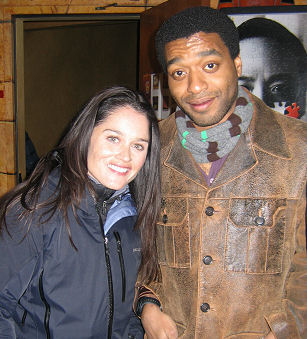
Open Window star Robin Tunney, Kinky Boots star Chiwetel Ejiofor (his close friends call him “Chewy”) prior to midnight showing of Open Window at the Egyptian.
When I was watching I didn’t give care at all about paying sufficient attention in order to understand or give a shit about the hawk-capturing metaphor. Movies with overt metaphors get be very old very quickly.
Any movie that makes a Paul Giamatti performance seem dull or running on empty is definitely doing something wrong, and Michael Pitt really needs to play an aver- age guy soon. Someone who smiles and wears clean clothes and brushes his teeth and talks in complete sentences. Pitt always plays barely articulate zone cases, and I’m starting to wonder if he can do anything else.
Open Window is a dull, decently made drama about a youngish Los Angeles couple coping with the trauma of the wife (Robin Tunney) having been raped in their home while the husband, a UCLA professor (Joel Edgerton), is away.
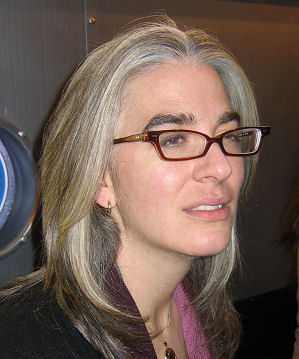
Sherrybaby director Laurie Collyer at Saturday’s Big Beach party at VW Lounge — 4:40 pm.
It’s a problem movie because it’s only about dealing with a problem and nothing much else. A bad thing happens, good people struggle with after-effects of the bad thing, recovery is slow and difficult, and so on. There’s a startling Repulsion-like moment about halfway through, but nothing else got me.
The problem with midnight screenings is that they always start at 12:30 am after the talent introductions and the short and the initial start-up delays, so you wind up gettign to sleep at 3 ayem and then the next day is late-starting and a whole late- rising, late-to-bed cycle begins.
It’s now 1:25 pm. I’m just finishing and haven’t showered so I’ll be missing the 3 pm Eccles screening of Stewart Copeland’s Everyone Stares, his doc about touring with the Police. That settles it — no more midnight screenings.
Saturday Grabs
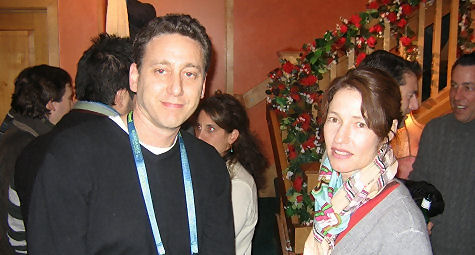
Cinetic Media’s John Sloss, Little Miss Sunshine director Valerie Fairs at Big Beach party — Saturday, 4:45 pm.


Ulrich Thomsen, star of Christopher Boe’s Allegro and Anders Thomas Jensen’s Adam’s Apples.

The traffic gets worse every year. From the Library up to Main Street is a total parking lot. I jumped off the bus and got into town much faster by walking.












